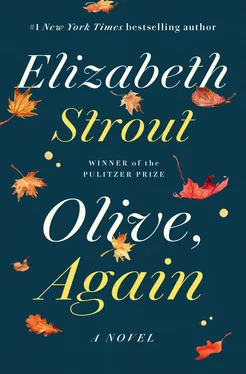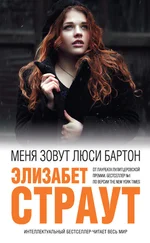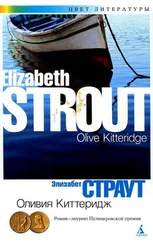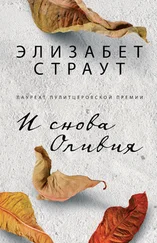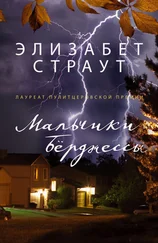“Ay-yuh,” said Mrs. Kitteridge; the bag she carried banged against her side.
Around them a sudden gust of wind sent a few twigs swirling, and a muddy plastic bag that had been run over a number of times rose slightly, then dropped back to the ground among slushy car tracks from the old snow. Cindy opened the door to her car, got in, and realized Mrs. Kitteridge was waiting. “I’m okay now. Goodbye, Mrs. Kitteridge.”
The woman nodded, and Cindy did not turn to look at her once she pulled her car out.
The drive seemed interminable, though it was less than a mile, and because it was a Saturday afternoon, it seemed to Cindy that there was more traffic than usual. When she got home she left the car in the driveway, though the door to the garage was open. The Christmas wreath was still on the front door, and she wished Tom would take it down. She must have told him a hundred times that now it was well into February, the Christmas wreath should come down. Cindy put the groceries onto the counter in their cloth bag. “Hi, honey,” she called to her husband, and Tom came into the kitchen and said, “Hey, Cindy— See? You did it.” He took the butter and the soup and the milk from the bag and said, “Want to watch some TV?” She shook her head and moved past him up the stairs. Too late she remembered about the Christmas wreath; she would remind him later.

Twenty years ago they had built this house. To Cindy it had seemed huge. She had been embarrassed by it as she watched the construction, the basement poured, the two-by-fours going up; she and Tom had seemed too young for such a large house. Cindy had grown up right outside of Crosby, in a house that had been very small; they had had almost no money, she and her mother and her two sisters. Her father had left the family years earlier, and Cindy’s mother worked night shifts at the hospital as a nurse’s aide; it had not been easy. But Cindy had been lucky; she had gone to the university, paying her way and borrowing money. And there she had met her husband, who went on to work in the accounting office at the ironworks where he had been ever since. Only later did Cindy realize that this house they had built was a regular-size house, with three bedrooms upstairs and a living room and dining room and kitchen downstairs. A few years later they built the garage, attached to the house, and instead of that making the place look bigger, somehow it caused the house to seem smaller. A perfect-size house; for years she had thought that. But as the boys reached adolescence, she started to think that the house looked ordinary, and she asked Tom if it could be painted a robin’s-egg blue. The boys had objected; she let it go, and the house had remained white all these years.
Cindy lay down on the bed and looked through the window at the tops of the trees, the limbs bare, and yet there was that funny little soft sun that sneaks around on a cloud-filled afternoon in February—what was it? The bare branches seemed to reach out, reach out, the opposite of shrinking.
—
When she saw Tom standing in the doorway of the bedroom, his face open, looking to please, absolutely helpless, she said, “You know what I’ve been thinking lately?”
“What, sweetheart?” Tom came into the room and reached for her hand. “What have you been thinking?”
“How I wanted to paint this house blue, and we never did it, because the boys—and you—said no, you didn’t want to.”
Tom’s big face seemed in her eyes to get slightly bigger, and he said, “Well, let’s do it now, sweetheart. We can have the house painted any color you want. Let’s do that!”
Cindy shook her head.
“No, I mean it.” Tom bent his head down toward her. “It would be fun, sweetie heart. Let’s paint the house.”
“No.” She shook her head again and turned her face away from him.
“Sweetheart—”
“Oh, Tom. Stop. Please. I said no. We are not going to paint the house now.” She waited a moment, then said, “Honey, can you please take down the wreath that’s still on the front door?”
“Right now,” he said, nodding. “Sweetie heart, consider the wreath gone.”

Before her illness, Cindy had worked as a librarian at the local library. She loved books, oh, did she love books. She loved the feel of them, and the smell of them, and she had loved the semi-quiet of the library, as well as the old people who came sometimes for the whole morning, just to have a place to go. She had liked helping them get online with a computer, or finding the magazine they wanted to read. Most of all, she had loved checking out books, mentioning to people the books she liked; these people would come back and talk to her about the books they had read at her suggestion. Cindy used to read everything, and even now there were books piled on the table beside the bed, books were piled up on the windowsill, and some on the floor as well. She almost had no preference for any kind of book, and she had sometimes thought that odd; she had read Shakespeare and the thrillers of Sharon McDonald, and biographies of Samuel Johnson and different playwrights, silly romance novels, and also—the poets. She thought, privately, that poets just about sat on the right hand of God.
When she was young, Cindy had thought about being a poet—what a silly idea. But as a child she had liked poetry; her third-grade teacher had given her a copy of Edna St. Vincent Millay’s Poems Selected for Young People, and when her little sister colored all over it in red crayon, Cindy hit her. Always this memory caused Cindy deep pain, because of what had happened later to her little sister. But Cindy had memorized all the poems in the book before they were colored over in red, and she felt—somehow—that it had ushered her into a world far away from her tiny home. This was partly because her teacher had told her that Edna St. Vincent Millay had grown up in Maine too, only an hour away; and that the poet, as a young girl, had been raised in poverty. The teacher had been kind in how she said that, and it was not until years later that Cindy realized it was to help her, Cindy, with her own circumstances of need. Cindy had written some poetry, but only for herself; she knew nothing about it, really. Andrea L’Rieux, who was two years younger than Cindy, had become the Poet Laureate of the United States a year ago, and Cindy felt a vast and secret pride that this person from Crosby, Maine, had accomplished such a thing. In truth, Cindy did not always understand the poetry that Andrea wrote. But it was brave; Cindy knew that. The poetry was a lot about Andrea’s life, and Cindy understood, reading it, that she, Cindy, could never have done what Andrea did. She could never have written about her mother in such a way, could never have written down the revulsion she felt at the sight of her mother’s cheeks drawing in as she smoked, nor even could she have written anything about herself.
What she would have written about was the light in February. How it changed the way the world looked. People complained about February; it was cold and snowy and oftentimes wet and damp, and people were ready for spring. But for Cindy the light of the month had always been like a secret, and it remained a secret even now. Because in February the days were really getting longer and you could see it, if you really looked. You could see how at the end of each day the world seemed cracked open and the extra light made its way across the stark trees, and promised. It promised , that light, and what a thing that was. As Cindy lay on her bed she could see this even now, the gold of the last light opening the world.
Читать дальше
